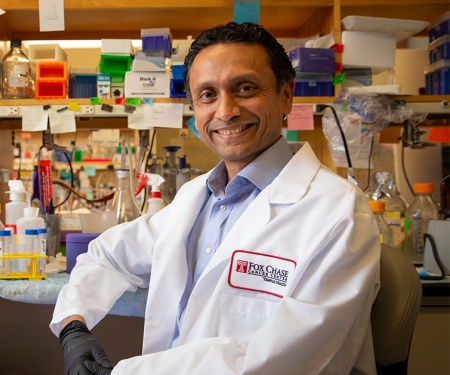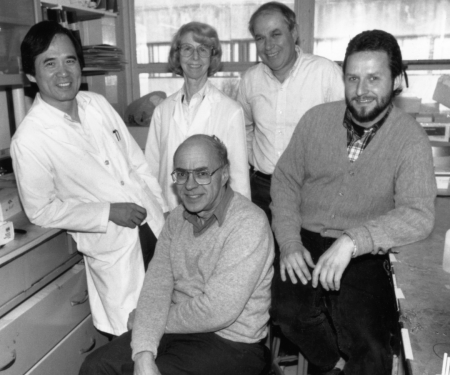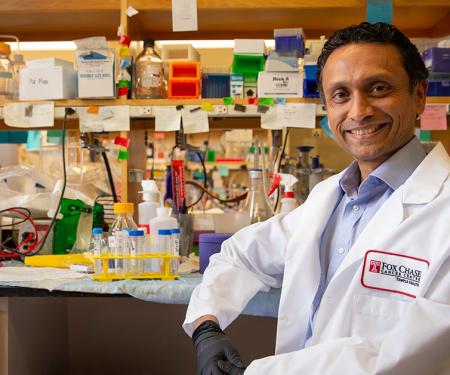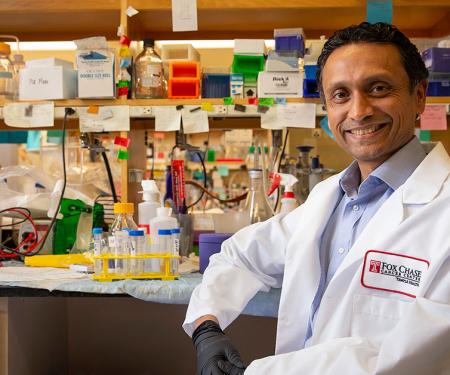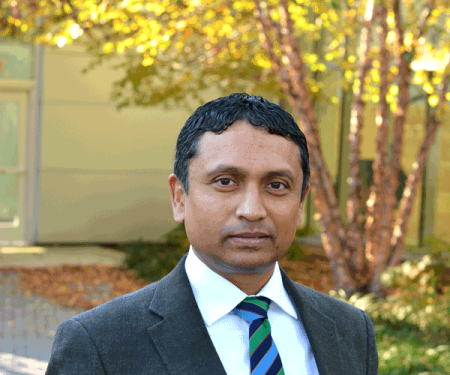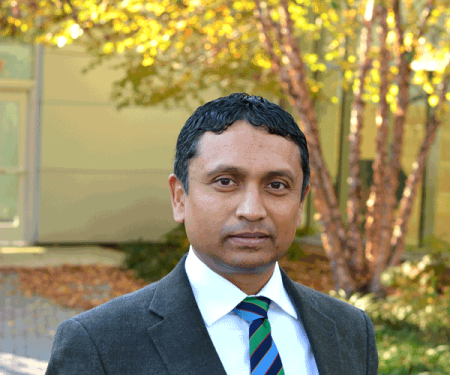This Fox Chase professor participates in the Undergraduate Summer Research Fellowship.
Learn more about Research Volunteering.
Related Articles
00 / 00
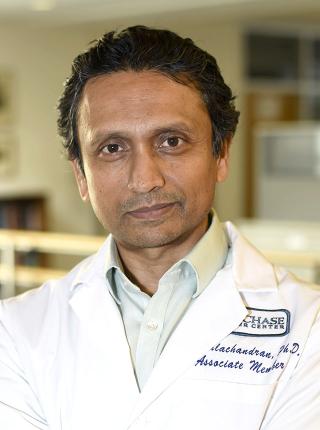
This Fox Chase professor participates in the Undergraduate Summer Research Fellowship.
Learn more about Research Volunteering.
Professor
Director, Center for Immunology
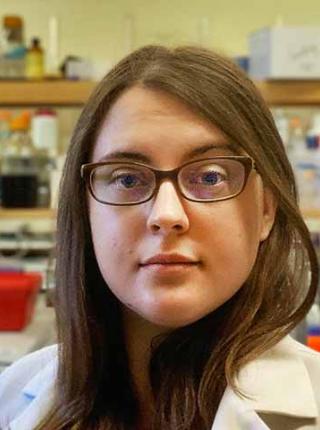
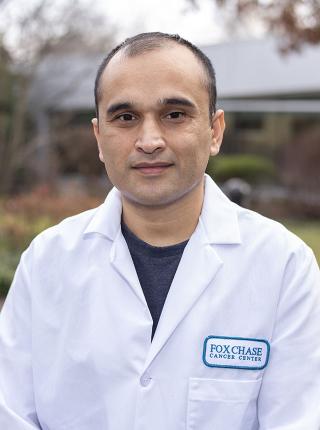

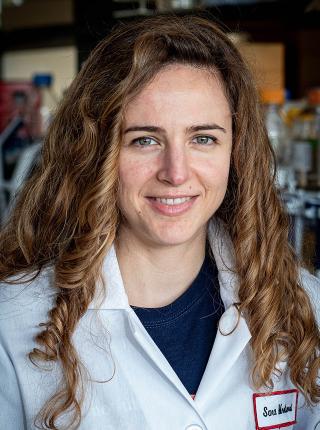



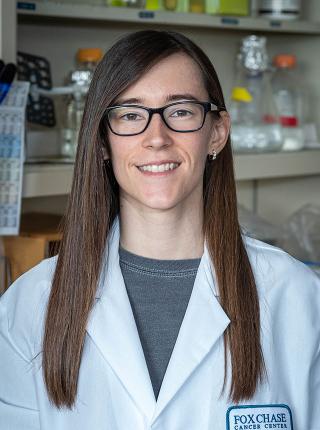

The Balachandran lab is interested in how cells die during host innate-immune responses to viruses and bacteria, and in exploiting these mechanisms for the treatment of human disease, whether infectious, inflammatory or malignant. In particular, the lab is interested in a form of programmed cell death termed necroptosis, driven by the kinase RIPK3. Unlike apoptosis, which proceeds via a caspase cascade that results in the ordered disassembly of the cell, necroptosis is caspase independent and driven by the RIPK3 substrate MLKL. Once activated by RIPK3, MLKL translocates to cellular membranes and induces their disruption, resulting in a form of necrotic cell death. Necroptosis is activated by several classes of innate-immune receptor (e.g., TLRs and cytokines such as TNF-α and interferons) and pathogen (e.g., RNA viruses, DNA viruses, certain gram-negative bacteria). The Balachandran lab is interested in how viruses (particularly RNA viruses), gram-negative bacteria, cytokines, and cellular stresses activate the necroptosis machinery, how necroptosis functions during acute viral and microbial infections to control pathogen spread, and how this death modality can be leveraged for immunotherapy.
The Balachandran lab is interested in how cells die during host innate-immune responses to viruses and bacteria, and in exploiting these mechanisms for the treatment of human disease, whether infectious, inflammatory or malignant. In particular, the lab is interested in a form of programmed cell death termed necroptosis, driven by the kinase RIPK3. Unlike apoptosis, which proceeds via a caspase cascade that results in the ordered disassembly of the cell, necroptosis is caspase independent and driven by the RIPK3 substrate MLKL. Once activated by RIPK3, MLKL translocates to cellular membranes and induces their disruption, resulting in a form of necrotic cell death. Necroptosis is activated by several classes of innate-immune receptor (e.g., TLRs and cytokines such as TNF-α and interferons) and pathogen (e.g., RNA viruses, DNA viruses, certain gram-negative bacteria). The Balachandran lab is interested in how viruses (particularly RNA viruses), gram-negative bacteria, cytokines, and cellular stresses activate the necroptosis machinery, how necroptosis functions during acute viral and microbial infections to control pathogen spread, and how this death modality can be leveraged for immunotherapy.
The lab has recently outlined a pathway by which interferons (IFNs), a family of cytokines with well-known antiviral and immunomodulatory properties, activate RIPK1/3 kinases and trigger necroptotic death. The laboratory continues to work on how IFNs activate RIPK1/3 kinases, and the regulatory mechanisms that normally restrain these kinases in unstimulated cells and only license necroptosis in susceptible cells. We have identified two such mechanisms that protect cells from IFNs: the adaptor protein FADD and the transcription factor NF-κB. Current projects in this area are centered on how FADD (and caspases) are disabled to allow IFNs to trigger necroptosis during an active infection. An allied area of interest is to test the feasibility of NF-κB blockade as a combinatorial approach for the treatment of IFN-responsive human cancers.
More recently, the laboratory has identified RIPK3-activated cell death as an important host defense mechanism that limits spread of RNA viruses, including influenza A. Influenza A viruses produce Z-RNAs, which are novel left-handed RNA duplexes previously thought not to exist in nature; these Z-RNAs trigger the host sensor protein ZBP1, which, in turn, activates, RIPK3, and drives the activation of both MLKL-dependent necroptosis as well as a parallel pathway of FADD/caspase 8-mediated apoptosis. Molecular- and animal model-based approaches are being used to identify additional determinants and regulators of virus-induced necroptosis, relevant cell types in vivo that die by RIPK3-dependent mechanisms, and the physiological contribution of discrete cell death pathways to the control of an acute RNA virus infection.
Finally, the Balachandran laboratory is interested in leveraging necroptosis for immunotherapy, by targeting RIPK1/3 kinases in human cancers that respond to IFN therapy, or by activating ZBP1 in the tumor microenvironment by small-molecule approaches. The latter approach is of particular interest because ZBP1 can activate a form of ‘nuclear necroptosis’ that is even more immunogenic that conventional (i.e., cytoplasm-induced) necroptosis. Indeed, a major reason for the non-responsiveness of these so-called ‘cold’ tumors is that they lack an immunogenic tumor microenvironment (TME) and thus escape T-cell killing despite expressing ICB targets. How to selectively intensify the immunogenicity of the TME has been an unmet challenge. Two broad strategies are commonly pursued: the first is to increase the visibility of tumor cells to the immune system, for example, by inducing tumor cells to die by necrotic lysis, which is highly immunogenic. The second is to induce an immunogenic state in cells of the TME. We have developed small molecule approaches that straddle both strategies to directly activate ZBP1 to trigger ‘on-demand’ nuclear necroptosis in tumor cells, as well as in cells of the TME. We are currently evaluating the potential clinical benefit of these approaches in mouse models of melanoma and other solid cancers.
Thapa RJ, Nogusa S, Chen P, Maki JL, Lerro A, Andrake, M, Rall GF, Degterev A, Balachandran S. Interferon-induced RIP1/RIP3-mediated necrosis requires PKR and is licensed by FADD and caspases. Proc Natl Acad Sci USA. 2013;110:e3109-18. PubMed
Thapa RJ, Chen P, Cheung M, Nogusa S, Pei J, Peri S, Testa JR, Balachandran S. NF-κB inhibition by bortezomib permits interferon-γ-activated RIP1 kinase-dependent necrosis in renal cell carcinoma. Mol Cancer Ther. 2013;12:1568-78. PubMed
Chen P, Nogusa S, Thapa RJ, Shaller C, Simmons H, Peri S, Adams GP, Balachandran S. Anti-CD70 immunocytokines for exploitation of interferon-γ-induced RIP-1-dependent necrosis in renal cell carcinoma. PLoS One 2013;8:e61446. PubMed
Balachandran S, Adams GP. Interferon-γ-induced necrosis: an anti-tumor biotherapeutic perspective. J Interferon Cytokine Res. 2013;33:171-80. PubMed
Gautam A, Boyd DF, Nikhar S, Zhang T, Siokas I, Van de Velde LA, Gaevert J, Meliopoulos V, Thapa B, Rodriguez DA, Cai KQ, Yin C, Schnepf D, Beer J, DeAntoneo C, Williams RM, Shubina M, Livingston B, Zhang D, Andrake MD, Lee S, Boda R, Duddupudi AL, Crawford JC, Vogel P, Loch C, Schwemmle M, Fritz LC, Schultz-Cherry S, Green DR, Cuny GD, Thomas PG, Degterev A, Balachandran S. Necroptosis blockade prevents lung injury in severe influenza. Nature. 2024 Apr;628(8009):835-843. doi: 10.1038/s41586-024-07265-8. Epub 2024 Apr 10. PMID: 38600381; PMCID: PMC11151938. PubMed
DeAntoneo C, Herbert A, Balachandran S. Z-form nucleic acid-binding protein 1 (ZBP1) as a sensor of viral and cellular Z-RNAs: walking the razor's edge. Curr Opin Immunol. 2023 Aug;83:102347. doi: 10.1016/j.coi.2023.102347. Epub 2023 Jun 3. PMID: 37276820; PMCID: PMC10526625. PubMed
Zhang T, Yin C, Fedorov A, Qiao L, Bao H, Beknazarov N, Wang S, Gautam A, Williams RM, Crawford JC, Peri S, Studitsky V, Beg AA, Thomas PG, Walkley C, Xu Y, Poptsova M, Herbert A, Balachandran S. ADAR1 masks the cancer immunotherapeutic promise of ZBP1-driven necroptosis. Nature. 2022 Jun;606(7914):594-602. doi: 10.1038/s41586-022-04753-7. Epub 2022 May 25. PMID: 35614224; PMCID: PMC9373927. PubMed
DeAntoneo C, Danthi P, Balachandran S. Reovirus Activated Cell Death Pathways. Cells. 2022 May 27;11(11):1757. doi: 10.3390/cells11111757. PMID: 35681452; PMCID: PMC9179526. PubMed Collapse
This Fox Chase professor participates in the Undergraduate Summer Research Fellowship.
Learn more about Research Volunteering.
